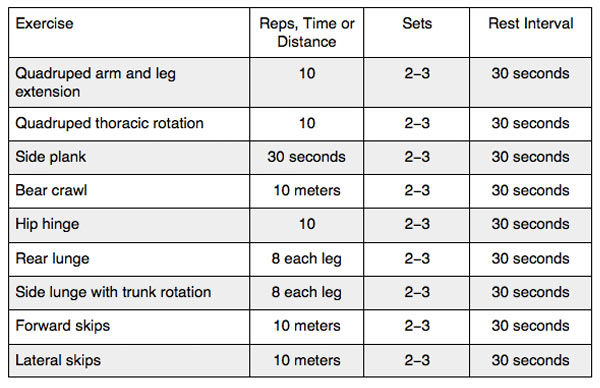Movement preparation, also referred to as a dynamic warm-up, involves moving in a variety of directions at different speeds to help activate the tissues along with the nervous, circulatory and respiratory systems responsible for controlling and fueling movement. Movement preparation can be an effective and functional way to prepare the body for a tough and physically demanding workout.
Performing a warm-up at the start of an exercise session:
- Increases circulation, which moves oxygen and nutrient-rich blood to the involved muscles
- Elevates tissue temperature so that muscles can rapidly lengthen and return to their starting shape
- Turns on the sensory receptors of the central nervous system responsible for identifying position changes in the body, which is essential for determining the appropriate motor response
- Elevates the levels of hormones and neurotransmitters responsible for providing energy during a workout.
- Rehearses movement patterns in slower, controlled tempos before adding resistance or moving at a fast speed
- Otherwise prepares the body for physical activity
Movement preparation exercises are an effective pre-workout warm-up because they move the body in all directions and involve a number of different muscles and joints. For best results, a movement preparation warm-up should start with exercises that focus on stability of the lumbar spine along with mobility of the hips and thoracic spine, while gradually increasing the level of intensity to allow tissue temperature and circulation to increase. Here are five ways that movement preparation works as an effective pre-workout warm-up strategy:
- Joint capsules and ligament endings contain numerous sensory receptors that measure and identify pressure, movement and rate of movement of their respective joints. Slow, controlled movements through a complete range of motion allows the nervous system to learn how to regulate the degrees of freedom allowed in each individual joint.
- Muscles are comprised of two different kinds of tissue: the contractile element of the actin and myosin proteins and the elastic component of the fascia and connective tissue, which surrounds every muscle fiber down to the most microscopic level. Muscle and fascia contain sensory receptors that sense tension, length change and rate of length change. Movement preparation exercises engage the sensory receptors in both the contractile and elastic tissues to fully involve the central nervous system and prepare it to control the muscles used in the workout.
- As muscles lengthen, the muscle spindles sense the rate of length change and communicate with motor neurons to initiate muscle contractions. Movement preparation exercises increase nervous system activity within muscles, making them more effective at producing powerful contractions during exercise.
- Multiplanar movements at a variety of rhythmic speeds increase heat in the body. As body temperature elevates, muscle and fascia become more pliable and capable of lengthening and shortening at faster rates of speed.
- Reciprocal inhibition refers to the physiological action that occurs when the shortening or contracting of one muscle sends a signal to its functional antagonist (the muscle on the other side of a joint), which allows it to lengthen. The controlled contractions during movement preparation exercises use the principle of reciprocal inhibition to allow muscles to lengthen and prepare for activity.
An effective movement preparation sequence involves all of the foundational movement patterns of exercise: lunging, squatting, pushing, pulling and rotating. Start with slow, controlled movements and gradually progress to challenging, fast-paced multidirectional movement patterns. The body can take at least eight to 12 minutes to fully warm up. Therefore, setting aside the proper time for a complete movement preparation sequence can help ensure your client’s workout is a success.
Movement Preparation Warm-up:





 by
by 




 by
by